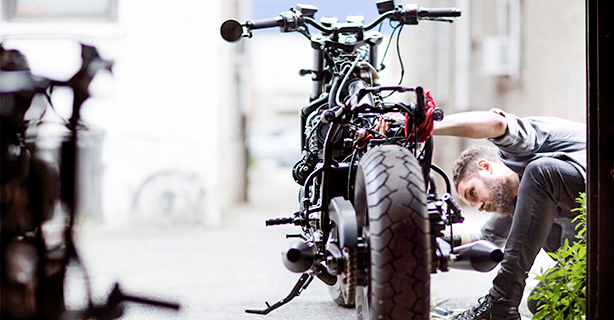Motorcycle prep: Three things to do before spring
0 min. read
Contrary to what motorcycle riders might feel after months of road conditions that make it impossible to ride, winter doesn’t last forever. Just when you’ve had enough of the cold and snow, the first day of motorcycle season finally arrives.
Here are three things you can do to get prepared to get back on the road.
Planning for your first ride of the year
All successful endeavors begin with solid planning, and this applies to being ready to ride on the first beautiful day of spring. It’s not as simple as pulling off the cover, turning the key, and getting on the road – your bike will need some TLC. Here are three main areas you need to evaluate:
Your motorcycle’s condition
Your riding skills and knowledge
Your riding gear
Don't get stuck discovering that you're not ready to ride when the first gorgeous day arrives – by that point, your local motorcycle shop will likely have no available appointments left. In addition, rider education course schedules will soon be booked through mid-summer.
Good planning will serve you well. Now is the time to pull out the calendar and schedule a spring tune-up or any repairs and reserve a space in a rider education course.
Inspecting your motorcycle's condition
Most of us have a pretty good idea of the mechanical shape our motorcycle was in when we stored it for the winter. But time changes everything. Give your motorcycle a thorough inspection. If anything seems like it might need extra servicing, call the shop.
T-CLOCS is a familiar term motorcycle riders use to guide them through the process. You should know it, love it, and memorize it, as it deals with maintenance for your bike throughout the year—not just for spring. It stands for:
Tires
Controls
Lights and electronics
Oil and other fluids
Chassis
Stands
The Motorcycle Safety Foundation recommends a T-CLOCS inspection before any ride, but especially after a motorcycle has been hibernating during a long winter. Doing this inspection will take a little time, but when it comes to safety, it's worth it. If you’re not comfortable doing these tasks yourself, have the service shop take care of it during an appointment.
Inspections shouldn’t be relegated to just your motorcycle. You should also pull out all your riding gear and examine it carefully to ensure it's still roadworthy. Here’s a quick checklist in regards to gear:
Does it still fit as it should?
Is the stitching and material on your jacket, chaps, or riding-suit sound?
Are all the zippers, snaps, belts, and other hardware in working order?
Has your helmet been damaged? Is it too old (more than five years)?
Refreshing your riding skills
Even riders with years of experience will need to refresh their riding skills every once in a while. Give yourself some time to get reacquainted with your bike.
We recommend that riders take a rider education course at least every other year. Whether you’re taking a class this year or not, practicing basic riding skills is an important thing to do on a regular basis, especially at the beginning of a new season. Here are some skills to work on:
Braking
Swerving
Cornering and counter-steering
Obstacle avoidance
Scanning for hazards
Depending on how early you’re hitting the road after the snow is off the road, road conditions could be quite rough after a winter of freezing and thawing. Road crews spend a good portion of spring fixing potholes and cracks in the road, which causes major hazards for motorcycles. Ride with caution, watch your speed, and wear protective clothing.
We also recommend that you check out materials from your last rider education course and explore other areas of the Motorcycle Safety Foundation online library.
Till next time, ride safe!
The general information in this blog is for informational or entertainment purposes only. View our blog disclaimer.
*Data accuracy is subject to this article's publication date.







